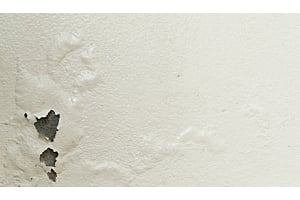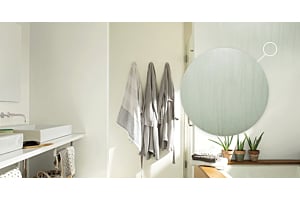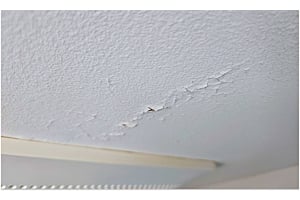
High-hiding paints and self-priming paint products make it seem okay to skip that base coat of primer. But there are many interior and exterior paint projects when it’s still important to use primer. Our experts explain here when you absolutely must prime before painting.
Does anything on this checklist describe your project? If so, you need to prime!
Now get all the details…
Wall Patches, New Plaster, and Unpainted Drywall
Primer is always necessary on new drywall and plaster to seal the porous surface and create a smooth, uniform base coat. Walls with a skim coat will need a full coat of primer. Patched areas should also be spot-primed before painting, so if you’ve done drywall repair such as filling in nail holes or dents, be sure to sand and prime those spots.
If you don’t prime walls before painting new drywall or plaster, the paint absorbs into the surface unevenly, leaving an inconsistent finish with patched areas showing through the final coat of paint.
Unpainted Woodwork
Just like fresh drywall, any type of bare wood surface needs a coat of bonding primer before painting. Sealing trim like new door or window casings, crown molding, and baseboards before painting helps guarantee a smooth, professional finish.
If you don’t prime before painting bare wood, the paint will absorb into the wood, creating an uneven finish. Knots and tannins in the wood can bleed through the new paint, ruining your paint job. (Use oil-based primer for wood with knots or tannins.)

Unpainted Plaster, Drywall, or Wood? Use Benjamin Moore Fresh Start High-Hiding Primer
Our best all-purpose acrylic primer with a mildew-resistant coating that’s fast drying and seals porous surfaces.
Significant Color Changes
Using a paint primer is important if your new paint color is a much lighter or darker color than the old color because self-priming paints don’t provide sufficient coverage when there is a dramatic color change. You need a primer coat to keep the old paint color from affecting the look of the new color.
For example, if you’re changing from blue to yellow and you skip priming, the blue could cause the new color to appear as if it has green undertones.
Using a separate primer also saves money because it costs significantly less than paint and helps achieve better coverage. Two coats of self-priming paint often aren't enough for significant color changes—so skipping primer usually means wasting valuable paint to do the job that primer was designed for.
![]()
Ring’s End Pro Tip: Professional painters often tint the primer so it’s close to the chosen paint color. Tinted primer is a great idea when you have a dramatic color change because it adds extra coverage and color support for the new shade.
Paint experts like those at Ring’s End can look at your chosen paint color and select the right primer tint for your project.
Surfaces Previously Painted with Oil-Based Paint
Most acrylic and latex paints will not stick to oil-painted surfaces without primer. So before you begin, it’s important to check whether the existing paint is oil-based or water-based. In older homes, the wood trim and walls were usually painted with oil-based paints, so it’s important to know what’s on your walls.
![]()
Ring’s End Pro Tip: There is an easy way to tell what type of paint is on a surface. Just dip a white rag or cotton ball in 70% isopropyl alcohol and rub it vigorously on the surface.
If the paint does not come off, it’s an oil-based or alkyd paint. If it does come off, it’s a water-based acrylic or latex paint. Now you’ll know whether you need to prime first!
If you forego the primer, your new paint job may wrinkle as it dries, and it will peel sooner because the paint just doesn’t have enough grip on the surface.
Stained or Discolored Walls and Ceilings
Priming is imperative when repainting walls and ceilings that have stains or discoloration from crayons, grease, smoke, water damage, or mildew.
Regular paint will not seal the surface, while primer will prevent the stains from bleeding through your fresh new paint. Darker stains like tobacco smoke may require two coats of primer in addition to two coats of paint. And never prime or paint over dirt or dust – you can’t skip the prep just because you’re priming!
Glossy Surfaces
Satin, semi-gloss, and glossy paint finishes are too slick for new paint to adhere well. A coat of primer creates a “grippy” surface that helps the new paint stick. Whether a homeowner or pro, plan to use primer when repainting doors, trim, and cabinetry.
If you don’t prime, the paint job will eventually chip or peel if the old surface wasn’t prepared correctly—even if it looks good at first.
Now get all the details explaining why you need to prime—and what happens if you don’t…
Now get all the details explaining why you need to prime—and what happens if you don’t…
Unpainted Siding or Wood Trim
Primer is absolutely necessary on new wood siding and trim to seal the porous surface and create a smooth, uniform base coat, helping to guarantee a smooth, professional finish.
If you don’t prime before painting bare wood, knots and tannins in the wood can bleed through the new paint, ruining your paint job. Be sure to use a primer with excellent stain blocking for tannin-rich woods like cedar or redwood.

Unpainted siding or wood trim? Use Benjamin Moore Fresh Start Deck & Siding Oil-Based Exterior Wood Primer
Outstanding stain suppression and excellent penetration for maximum adhesion and a long-lasting finish.
Exterior Surfaces with Repairs
Patched areas should be spot-primed before painting. If you’ve filled in nail holes or patched damaged siding, be sure to prime those areas after sanding.
Without primer, the paint absorbs into the surface unevenly, leaving an inconsistent finish with patched areas showing through the final coat of paint.
Significant Color Changes to the Home’s Exterior
When changing a home’s exterior to a much lighter or darker color, using primer is essential. It acts as a barrier that prevents the old paint from bleeding through and affecting the new color.
Using a separate primer also saves money because it costs significantly less than exterior paint and helps achieve better coverage. Two coats of self-priming paint often aren't enough for dramatic color changes—so skipping primer means wasting valuable paint to do the job that primer was designed for.
Stained, Discolored, or Mildewed Surfaces
Exterior priming is a no-brainer when dealing with stains, mold, or mildew. Primer creates a strong bond between the surface and the paint while blocking and sealing stains, preventing them from bleeding through the final coat.
If you’re dealing with mold and mildew, a mildew-resistant primer is your best bet. These primers contain antimicrobial agents that inhibit recurring growth of mold and mildew. on the surface of the paint film.
Begin by cleaning and prepping the surface. We recommend ZinsserJOMAX or 30 Seconds Outdoor Cleaner.
When you don’t clean and prime stained and mildewed surfaces, the old problems just come back—it won’t be long before the stains bleed through or the mildew starts growing again.

Covering stains? Fighting mildew? Use Benjamin Moore Fresh Start High Hiding Primer
Excellent adhesion plus antimicrobial and stain-blocking properties.
PVC Siding or Vinyl Siding
Does your house have vinyl siding, PVC trim, or plastic shutters? If so, a “bonding primer” will be your best friend because it’s made for adhesion to hard-to-coat surfaces.
We recommend INSL-X STIX, which is known for maximum adhesion on the most difficult substrates and is rated for both interior and exterior use. (Note that it is never recommended to paint drastic color changes on vinyl, as the vinyl can get too hot and cause the coating to fail — even with the best primer.)
Wondering what happens if you don’t prime vinyl? Premature peeling and cracking because the new paint doesn’t stick to the vinyl in the long run.

Painting vinyl or other hard-to-coat surfaces? Use INSL-X STIX Waterborne Bonding Primer
Adheres to almost any substrate and can be used with alkyd, acrylic latex, urethane, epoxy, lacquer, and other types of topcoats.
Exterior Doors and Other Glossy Surfaces
Yes, exterior doors need to be primed. As a general rule, high-gloss surfaces need primer to increase adhesion and create the best possible surface for the topcoat. You won’t regret the time spent priming—and increasing your curb appeal.
If you don’t prime, your exterior doors will peel sooner because the old paint and the new paint didn’t stick to each other.
Exterior Surfaces Previously Painted with Oil-Based Paint
You’ll need to prime over oil-based paint for sure! Primer creates a surface the new paint will adhere to. Especially when repainting older homes, take time to find out if the old paint is oil based. Refer back to our interiors section on oil-based paint which explains more about this.
If you skip the primer, the new paint may wrinkle as it dries, and even the best paint will peel much sooner than if you primed first.
If you have remaining questions about whether or not you should use primer, how much to use, and what kind – contact the paint experts at Ring’s End using our online chat or by texting (203)-PRO HELP. We’ll be happy to help!





